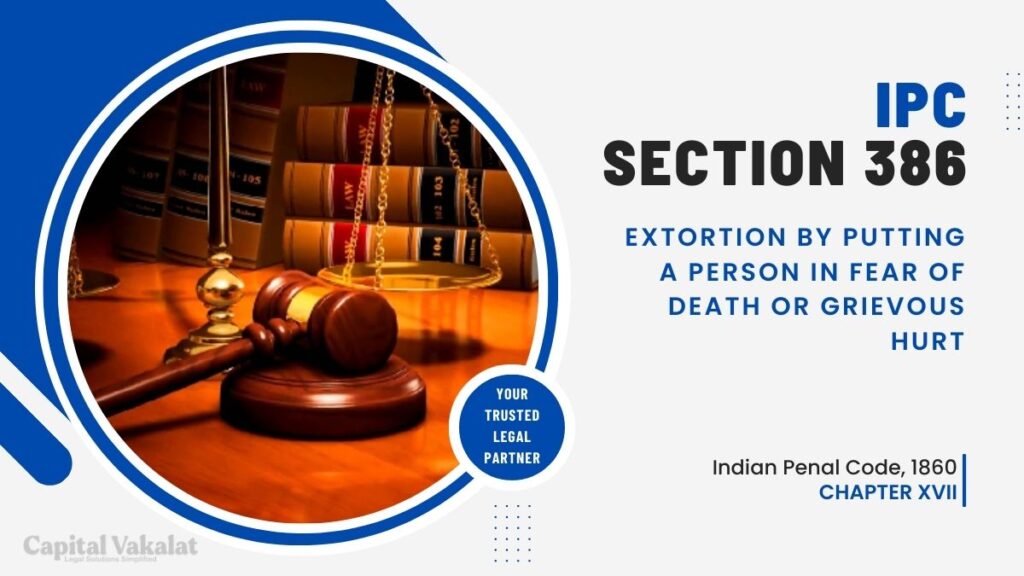Extortion, a term that evokes a sense of fear and intimidation, is a serious offense that our legal system addresses under various sections. In this article, we delve into Section 386 of the Indian Penal Code (IPC), specifically focusing on extortion by putting a person in fear of death or grievous hurt.

Understanding the nuances of this legal provision is crucial, considering its potential impact on individuals and society at large.
Understanding Section 386 IPC
Section 386 of the IPC defines the offense of extortion by putting a person in fear of death or grievous hurt. To establish this offense, certain elements must be present, emphasizing the severity of the threat involved. The section aims to protect individuals from coercion tactics that involve life-threatening consequences.
Legal Consequences
The legal repercussions for those found guilty under Section 386 are stringent. Offenders face penalties and punishments commensurate with the severity of their actions. This section acts as a deterrent, and exploring real-life examples can provide valuable insights into its application.
Real-life Examples
Examining notable cases where individuals faced extortion by fear of death or grievous hurt sheds light on the gravity of such offenses. These cases serve as cautionary tales, highlighting the importance of a robust legal framework in addressing and preventing such acts.
Impact on Victims
The psychological impact on individuals who have faced threats of death or grievous harm is profound. Beyond the immediate fear, victims often grapple with long-term consequences that affect their mental and emotional well-being. Understanding these effects is crucial for developing comprehensive support systems.
Preventive Measures
Individuals can take proactive measures to protect themselves from extortion attempts. Knowing one’s legal rights and seeking timely intervention can be instrumental. This section explores practical steps individuals can take and the legal avenues available for protection.
Role of Law Enforcement
Law enforcement agencies play a pivotal role in handling cases falling under Section 386 IPC. Collaborative efforts with the community, awareness campaigns, and efficient investigation techniques contribute to combating extortion effectively.
Social and Economic Implications
Extortion has far-reaching consequences for society and the economy. This section examines how these crimes impact the social fabric and economic stability. Understanding these implications is essential for devising strategies to mitigate the broader effects.
Challenges in Prosecution
Prosecuting extortion cases, particularly those involving threats of death or grievous hurt, poses significant challenges. From gathering evidence to establishing intent, overcoming these hurdles is essential for ensuring justice. Proposed solutions are discussed to address these challenges effectively.
Conclusion
In conclusion, Section 386 IPC plays a vital role in safeguarding individuals from extortion tactics involving threats of death or grievous harm. The legal consequences, real-life examples, and the impact on victims underscore the significance of a robust legal framework. As society evolves, addressing challenges in prosecution and implementing preventive measures become imperative to curb such offenses.
Frequently Asked Questions
How can individuals protect themselves from extortion threats?
Being aware of one’s legal rights, seeking timely legal advice, and reporting threats to law enforcement are essential steps in self-protection.
What role do community initiatives play in combating extortion?
Community engagement and awareness programs contribute significantly to creating a united front against extortion. Collaboration with law enforcement enhances overall effectiveness.
Are there any recent changes in legislation to address evolving extortion tactics?
Legislative bodies periodically review and update laws to address emerging challenges. Staying informed about any amendments is essential for legal practitioners and the general public.
What support systems are available for victims of extortion?
Victims can seek support from counseling services, victim advocacy organizations, and legal aid to navigate the aftermath of extortion incidents.